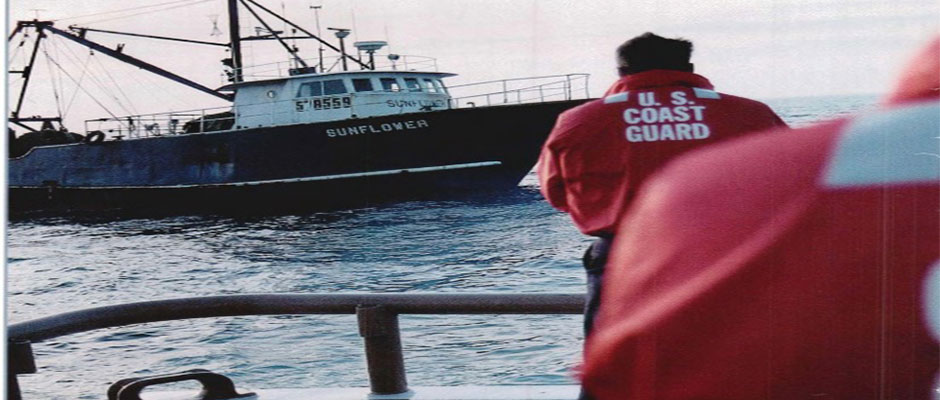Fisheries Enforcement: US Coast Guard Is Sharpening Enforcement Tools with Big-Data Help from CCICADA
 A Coast Guard vessel prepares to board a fishing boat to inspect its compliance with fisheries regulations.
A Coast Guard vessel prepares to board a fishing boat to inspect its compliance with fisheries regulations.
With 3.4 million square miles of ocean to patrol and protect, the US Coast Guard faces perhaps the most daunting task of any agency tasked with protecting the American public from homeland security threats.
 This is most evident in the Coast Guard’s mandate to enforce laws aimed at protecting the nation’s ocean fisheries from rapid depletion by illegal fishing. Giant commercial fleets are engaged in a literal war scouring the oceans for marine delicacies—even as the world’s fish stocks are disappearing. The Journal Science predicts that the world’s fisheries will collapse by 2048 without dramatic improvement in current conservation and enforcement measures.
This is most evident in the Coast Guard’s mandate to enforce laws aimed at protecting the nation’s ocean fisheries from rapid depletion by illegal fishing. Giant commercial fleets are engaged in a literal war scouring the oceans for marine delicacies—even as the world’s fish stocks are disappearing. The Journal Science predicts that the world’s fisheries will collapse by 2048 without dramatic improvement in current conservation and enforcement measures.
Fortunately, the Coast Guard has found help from what might seem an unlikely corner—a group of big-data experts from CCICADA, a Rutgers University-based homeland security enterprise. These computer and math brains know nothing about commercial fishing, and for that matter might never have held a fishing pole, but they are finding ways to make the Coast Guard’s impossible job more possible.
CCICADA’s partnership with the Coast Guard began with the USCG’s First Division in Boston, Massachusetts, a corner of the world where sought-after Atlantic cod and herring are already imperiled.
CCICADA is helping the Coast Guard to win the fisheries enforcement war by analyzing billions of bytes of data. The end game is twofold: 1) finding better ways to identify which boats are engaged in illegal fishing, and 2) making better use of the USCG’s very limited enforcement resources, such as manpower, boats and planes.
 To put the enormity of the Coast Guard’s task in perspective, compare their enforcement mission, given the resources at hand, with that of the New York City police Department. The USCG has about 40,000 active duty personnel to cover 3.4 million square miles of open ocean. The NYPD has a force of a similar size to cover just 322 square miles of city roads.
To put the enormity of the Coast Guard’s task in perspective, compare their enforcement mission, given the resources at hand, with that of the New York City police Department. The USCG has about 40,000 active duty personnel to cover 3.4 million square miles of open ocean. The NYPD has a force of a similar size to cover just 322 square miles of city roads.
This doesn’t even take into account the Coast Guard’s limited budget, which at $9 billion in recent years was $1 billion less than the Marine Corp’s budget just for personnel. Nor does it take into account an aging fleet of ships and planes capable of handling deep-water missions but already stretched thin by other USCG missions.
It is with these limited resources that the Coast Guard must protect a $30 billion US recreational and commercial fishing industry that employs tens of thousands of people and provides an important source of food for millions of Americans.






Leave a comment